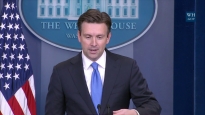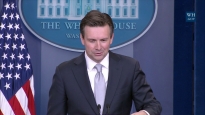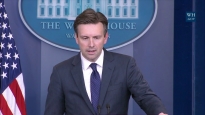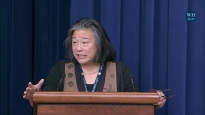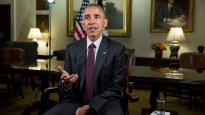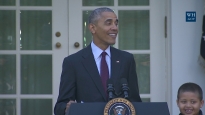Press Briefing
January 31, 2014 | 47:43 | Public Domain
White House Press Briefings are conducted most weekdays from the James S. Brady Press Briefing Room in the West Wing.
Press Briefing by Press Secretary Jay Carney, 1/31/14
James S. Brady Press Briefing Room
12:43 P.M. EST
MR. CARNEY: Good afternoon. Thanks for being here on Friday. It’s always a good day. It’s a little warmer I noticed. I have no announcements at the top except to say that I hope you were able to cover the President’s remarks at the long-term unemployment event today and recognize, as he does, that it’s vitally important that we come together to address this challenge. The long-term unemployed represent a significant problem within the issue of reducing the overall unemployment rate. And today’s action, I think, demonstrates the President’s desire to use every tool in his toolbox to expand opportunity, bring people together, and put more people back to work.
I’ll do the week ahead at the end, so I’ll go to questions now.
Darlene.
Q On immigration, in the interview the President gave to CNN he said he’s not going to prejudge what gets to his desk. And I was wondering if that is in some way him signaling that he is now open to possibly signing an immigration bill that does not have a pathway to citizenship in it, as he has insisted in the past that it needed to be approved.
MR. CARNEY: It means that he won’t prejudge what he hopes will be a bill that reaches his desk when, at this point, that bill, at least in the House, does not yet even exist. What the President said and others have noted is that we have seen significant and important progress, first in the Senate with a bipartisan bill that embodies the principles the President laid out, and now in the House, where it’s fair to say that the operating position a year or so ago was self-deportation; now there is movement. And that’s a good thing.
But we’re still early in this process and we are mindful of the fact that the House needs to take action, and we look forward to a debate being engaged in the country about why it’s so important to have comprehensive immigration reform, why it is so beneficial to the middle class, to the economy. There’s a reason why such a diverse coalition in support of legislation like this exists -- business and labor and pastors and police officers. It’s because it’s the right thing to do and because it’s so good for the economy and the country, for our security, and for the capacity for this nation to continue to be the home of innovation and entrepreneurship.
So I think the fact that the House leadership is now talking about its principles is a good thing. That’s what happened in the Senate. They started with principles and then they moved forward -- the Gang of Eight did -- with legislation. It certainly is where the President began when he put forward his principles.
So we remain, as the President noted yesterday and in previous days, very hopeful that 2014 will be the year that we get this done.
Q But when someone says they won’t prejudge something, it seems to me that it means they’re open to something else, or something different from what they wanted before.
MR. CARNEY: But the President’s position is well known. He said it on multiple occasions. It’s in black and white on the website in his statement of principles. It’s embodied in the legislation passed by the Senate. And the important thing is this is not about his view versus the view that may be embraced by some members of the House of Representatives. His view is the view of so many different people and constituencies across the country on the matter of citizenship and creating a pathway to it; on the general principle that we shouldn’t have a two-tiered society. But this is the beginning of a process in the House, not the end, and what he is saying is that he’s not going to prejudge that process when at this point, we have a single sheet of paper.
Q Can I ask one question quickly on the long-term unemployed event? What is the accountability piece of that? In other words, how will you know that these companies are not discriminating against long-term unemployed people?
MR. CARNEY: Well, I think a far greater expert on this than I, our Director of the National Economic Council, spoke at length with folks about this broader issue and the initiative, and what it means, what the commitments represent. And I think it reflects the fact that there are ways that a President, and in this case this President, can use the unique powers of the office to bring enormously important stakeholders to the table, or to the room, to address a challenge like this.
Now, all of the companies that have made commitments, some of them the biggest brand names in the world, have made clear that they’re going to move forward on this and they obviously have a lot at stake in fulfilling that obligation that they’re making. And that’s a good thing, and they should be commended for it. And that’s what the President did today.
Q Jay, has the President called Harry Reid to discuss his opposition to the fast track authority?
MR. CARNEY: Steve, as I said yesterday, Leader Reid’s position on this issue is well known. It was known prior to what he said earlier this week. We’re focused on, as the President has made clear, moving forward on trade agreements that expand opportunity for American workers, expand American exports and therefore growth, and that include protections on the environment and for American workers. And that’s what we’re going to continue to focus on doing. But again, as I can’t really go -- be more direct than I was yesterday, that the Leader’s position on this was known prior to this week.
Q But I guess, is the President going to actively seek to change Senator Reid’s mind?
MR. CARNEY: Again, what I can tell you is that the President is going to make clear in the days and weeks ahead why he supports expanding American exports, why trade agreements with Asia and Europe are good for American workers, good for the United States, good for our economy. And he is going to, and we are going to, the administration is going to, and others involved are going to engage Democrats and Republicans and other stakeholders in that discussion.
Q It’s being widely reported that the State Department will soon release its report on the Keystone Pipeline. What will the President’s or the White House involvement be in the next phase of this process?
MR. CARNEY: As the State Department has said, it will, the State Department, release its final environmental impact statement soon, and I would direct you to them for any further details. As a reminder, I would note that when that document is released, it does not or will not represent a decision, but rather another step in the process.
To go to your question about that process, there will be an opportunity after the release of the EIS for both the public and other government agencies to comment before the State Department makes its final national interest determination.
And again, for more details on the process, which is run at the State Department, I would refer you to the State Department.
Q One last thing -- will the President weigh in with the State Department?
MR. CARNEY: There’s a longstanding process, Steve, in place to determine whether projects like this are in the national interest. The President last year in a speech at Georgetown spoke very clearly about the national interest component of this project in particular. So I would refer to what he said.
And at this point the process is now at the State Department, and we’re going to let that run its course, as is in keeping with past practice of previous administrations.
Jim.
Q Getting back to this question about path to legalization, you said that the President doesn't want a two-tiered society. But if you only grant the millions of undocumented people in this country a pathway to legalization and not citizenship, and those people are in this country, they're playing by the rules, they're working hard, they're paying their taxes, but they have no hope of obtaining citizenship, doesn't that, in fact, create a two-tiered type of society?
MR. CARNEY: Jim, I think the President’s position on this is crystal-clear. He’s said it in his own words more times than I can remember. It’s reflected in the principles he laid out, which were the foundation for the legislation that was crafted by the Gang of Eight in the Senate, passed by the Senate with a strong bipartisan majority. His principles are embraced. They're not just his principles, but the principles he laid out that reflect the consensus out there are widely embraced. And what’s important to note now is that the process is moving forward. There is progress.
The fact, as I noted before, that the House leadership has demonstrated and made clear -- Speaker Boehner, Chairman Ryan and others made clear that this is an issue that needs to be addressed, that Congress needs to act on, that's obviously progress. And I don't think it would be a surprise that their principles might differ to some degree from the President’s, but the fact is what those principles represent is a significant evolution in the positive direction from where they were.
Q The President’s principles on a pathway to citizenship have not changed.
MR. CARNEY: Have not changed.
Q Okay. And, Jay, on Syria, I know you were asked about this during the gaggle, yesterday I believe, on -- I guess there are some reports that it appears Syria is dragging its feet a little bit on chemical weapons. Any update on that?
MR. CARNEY: I can say a little bit more about that. The international community is poised and ready to destroy Syria’s chemical weapons as soon as the chemicals have reached the Syrian Port of Latakia. It is the Assad regime’s responsibility to transport the chemicals to Latakia safely to facilitate their removal. And we expect them to meet their obligation to do so.
Syria must immediately take the necessary actions to comply with its obligations under the Chemical Weapons Convention and U.N. Security Council Resolution 2118, and ensure that the removal effort is conducted with regularity rather than after long intervals. We all know the Syrian regime has the capability to move these weapons. We know that because they’ve been moved multiple times before, during the conflict. U.N. Secretary General Ban Ki-moon has officially noted this capability in his report.
So let me quote him here. As Secretary General Ban said, “The Syrian Arab Republic has sufficient material and equipment necessary to carry out multiple ground movements to ensure the expeditious removal of chemical weapons material, and that it is imperative that Syria intensifies its efforts to expedite in-country movements of chemical weapons and continues to meet its obligations” under Security Council Resolution 2118 and OPCW Executive Council decision.
So we’re going to continue to work with our partners on this to keep up the pressure on the Assad regime and to support the OPCW-U.N. joint mission’s operations.
Q And what are the consequences if Syria does not follow through, if they continue to drag their feet on this?
MR. CARNEY: Well, again, they have obligation here. They have committed to doing this. This is a regime that refused to acknowledge that it possessed chemical weapons until a very short time ago and has now committed to not only acknowledging that it possesses the weapons, but moving them so they can be destroyed. And the United States and our partners in this effort will insist that Syria meet its commitments.
Let me go up and back here. Jared.
Q Thanks. I know Steve asked this question, but I’m still kind of confused related to Keystone. I know that the potential announcement today is just another step in the process, but is there going to be a time after the agencies and after the public has a time -- or has a time to comment that the President will weigh in? I mean, basically, this seems like such an important issue that it would be hard for me to conceive that the President wouldn’t be the person making the final decision after all the various steps are taken -- the environmental impact review, the public gets to comment. I mean, how could he not be the person making the final decision? Or would it be Secretary Kerry?
MR. CARNEY: The President has been, as I said earlier, clear about his views on what factor should play a role in determining whether this project fits that definition in terms of our national interest -- is it in our national interest. He spoke about this explicitly last year at his speech in Georgetown, so I would refer you to that as a clear exposition of the President’s views, not just generally, but on this specific project.
Now we can move forward, and there is a process that is in place and that must be honored, and that process goes through a series of steps; one, as the State Department has indicated, will take place soon with the release of an environmental impact statement. Then there is comment by the public and agencies, and the process moves forward from there. So I’m not going to predict how that works. For questions about how the process works or how it ends, I’d refer you to the State Department -- because that’s the way that you do these things, by the book.
The President’s views on the general matter and on this issue have been expressed.
Q And I understand you don’t want to lay out how the State Department is going to take its own steps, but why are you hesitant to say what he’s going to do after the State Department has taken all of its steps?
MR. CARNEY: Because I’m not going to make a statement about what the President is going to do based on something that hasn’t happened yet.
Q But is he going to do something --
MR. CARNEY: I have nothing -- I’m not going to predict the future, Jared. I think that’s he’s expressed his views on this matter and there’s a process underway at the State Department.
Q Jay, can I follow on that?
MR. CARNEY: Certainly.
Q I’m not sure he has expressed his views on that matter -- on this matter.
MR. CARNEY: Let me quote, if I may.
Q Please.
MR. CARNEY: “Allowing the Keystone Pipeline to be built requires a finding that doing so would be in our nation’s interest. And our national interest will be served only if this project does not significantly exacerbate the problem with carbon pollution.”
Q That’s exactly what I want to ask you about.
MR. CARNEY: “The net effects of the pipeline’s impact on our climate will be absolutely critical to determining whether this project is allowed to go forward. It’s relevant.” That’s a quote from the President’s speech at Georgetown University.
Q Does that mean that cheaper crude oil would exacerbate carbon pollution?
MR. CARNEY: It means what it says. There’s an environmental impact statement that’s being done in keeping with past practice. And for assessments related to the EIS I would refer you to the State Department.
Q But the President’s own worry -- his own question about whether it would exacerbate carbon pollution, is that a suggestion that --
MR. CARNEY: I think it’s pretty clear here. He says, “Only if this project does not significantly exacerbate the problem of carbon pollution, the net effects of the pipeline’s impact on our climate will be absolutely critical to determining whether this project is allowed to go forward.”
Q Let me then ask you about the 18 environmental organizations that wrote the President earlier this month saying his all-of-the-above energy strategy would be fundamentally at odds with cutting carbon pollution; that the energy policy goals of the administration make addressing climate change more difficult. I presume you do not agree with that. Why?
MR. CARNEY: I’m not sure which statement you’re talking about. We have reduced carbon pollution in this country under the President through the historic emissions standards that have been set and other steps that have been taken and will be taken.
We have pursued an all-of-the-above energy strategy, which has had -- or has contributed to a situation for the first time in 20 years where we are producing more oil at home than we’re importing from abroad, which enhances our national security and our energy independence. So absolutely, we strongly support an all-of-the-above energy approach. And all-of-the-above means -- includes natural gas, and the fact that it is a cleaner burning fuel is a positive thing for our environment. It includes wind and solar and biofuel technologies. You’ve heard it all before so I won’t delve into the details, but that's the right approach for the country, and it’s an approach that's paying dividends.
Q Jay, following up on that --
MR. CARNEY: Reid.
Q -- is the Keystone issue a headache for the President?
MR. CARNEY: Have you sent any emails today?
Q Not today. (Laughter.) Is the Keystone issue a headache for the President?
MR. CARNEY: Nobody followed that. You don't have enough followers. Okay, go ahead.
Q (Laughter.) Oooh --
MR. CARNEY: Or maybe I don't. But Reed inadvertently sent me an email meant for his editor, but it was all good. (Laughter.)
Q It could have been --
MR. CARNEY: No, he was completely fine. It could have been so much worse. (Laughter.) Go ahead. Sorry. Reid, I’m sorry. I thought -- you know, that's the funny thing about it, like you just think everybody sees what you see on Twitter, and they don't. But go ahead.
Q Is the Keystone issue a headache for the President or for the White House to have to be sort of torn between his environmental allies and sort of this idea of having to wait for the State Department process to play out?
MR. CARNEY: No. Obviously, these issues are complex. They require the sort of rigorous approach and assessments that are being undertaken by the State Department. And that is what it is. And the process is underway. A stage in that process is going to be reached, and soon. And the process will continue after that.
Q On the topic, isn’t the President a little bit frustrated? It’s been five years. I know in Ottawa, they are frustrated that it’s been taking so long. Isn’t the President a little bit frustrated that nothing is coming fast? I understand the process, but five years is a long process.
MR. CARNEY: Well, again, I would say that the State Department has said it will release its final environmental impact statement soon, and that’s a development in the process towards the direction of conclusion. So there’s that. And I won’t bore you with the history of why the process has taken as long as it has, but a significant reason for that has been the decision by -- was the decision by Republicans in Congress to make an ideological issue out of this, which set the process back.
Jim.
Q If I can go back to immigration for a moment, it did seem as though the President was saying that there was little difference between what the Republican principles were suggesting on pathway and what his principles were. And that little difference is what I’m interested in. The Republican principles call for legalization, and then going -- still being able to apply for citizenship, as I understand it, but just like everybody else does, without having to go back to your home country. So why wouldn’t that be acceptable to the President since his principle and what the Senate has already passed means something similar, where they would remain in this country and then get in a line that takes 12 to 15 years? So what is the difference?
MR. CARNEY: Again, here is a significant difference. There’s a significantly comprehensive bill that was developed and written, debated and passed in the Senate, and there’s a single piece of paper in the House. The details matter, and they matter a lot to millions of people across the country. So the President’s principles are very clear. His view that --
Q But he seemed to muddle just a little bit with this interview.
MR. CARNEY: No, no, he didn’t. What he is noting is that there is significant progress here, and that’s a positive development. It is in keeping with our view that there’s an opportunity in 2014 for comprehensive immigration reform to become a reality, to reach his desk in a form that he could sign it. Nobody is suggesting we’re there yet. I don’t think House Republicans would suggest we’re there yet. They have simply taken a step forward in that process, in many ways a beginning step -- the same beginning step that the President took, that the Senate took through the Gang of Eight, and now the House is taking. And that’s a positive thing.
But to say that we know what that process looks like at the end and we’re going to judge it now based on what it looks like at the beginning, I think is a mistake. And so that’s why the President is saying he’s not going to prejudge an outcome when we’re only at the beginning of a process in the House.
Q But if I could just point on that a little bit -- but the principle that the President has expressed and that was turned into legislation in the Senate versus the principle that the GOP has talked about in their one-pager that you’re talking about, if that resulted in legislation which reflected that principle, it sounds like the President is saying, “It’s that far apart, not much of a difference.” Am I reading too much into what he said?
MR. CARNEY: There’s a key word, only two letters, in your question: “If.” And you say a lot of things about what the final product might look like that is something that can’t be described in a single sentence because it’s going to have to be the result of a lot of debate and discussion and expert development, as was the case in the Senate, and we will see where that process leads.
The President’s principles, what the President supports, are very clear. And I would remind you, that’s not just the President’s view. This is not really about him at all, because what the Senate bill represents is not only a bipartisan piece of legislation, but the views and the will of an enormously diverse coalition across the country that understands, together, that comprehensive immigration reform delivers enormous benefits to the nation, to the middle class; to economic growth, as the CBO has noted in scoring the Senate bill; to border security. We’ve made enormous strides in border security over the last five years. The Senate bill, if implemented, would significantly enhance and build upon our security.
And then when it comes to making sure that everybody plays by the same set of rules, employers all play by the same rules, and making sure that we have a process in place that allows for exceptional students from abroad who come here and study and want to start businesses here to do that -- I mean, this is a big piece of business with enormous benefits. And you don’t often see coalitions like this come together -- a bunch of groups that don’t often see eye to eye on major issues, and they all agree on this, and they all agree on the principles that the President also shares.
So it’s not a question of his principles versus somebody else’s principles. There’s a big chunk of the country that shares the same view.
Peter.
Q Jay, as it relates to Amanda Knox, can you see any circumstance under which the U.S. would not grant an extradition request?
MR. CARNEY: This is a matter, as I understand it from my reading of the press, that’s still in a legal proceeding. And for questions about that issue I would refer you to the -- as a broad principle as opposed to a matter that’s still in a legal process, I would refer you to the State Department and the Department of Justice.
Q Broadly, has the President paid any attention to this given the fact that it’s got -- American interest?
MR. CARNEY: I have not had a discussion with him about the issue.
Q Okay. I want to ask you a little bit about what happened today, the remarks that the President made and what you said earlier in your conversation with reporters here about what the President’s desire is to have these best practices in terms of people’s consideration of those who have been unemployed for long periods of time. Can you articulate the frustration that exists for the President in the fact that the best he can do is have the use of the phone, as he describes it, but these conversations with these businesses where basically they come to an agreement that they’ll consider these people, but it remains that 1.6 million Americans since the start of this month have now lost their long-term unemployment benefits?
MR. CARNEY: Oh, I see where you’re headed. He’s enormously frustrated that the Senate -- that the Congress, rather, has refused to act on extending emergency unemployment benefits. I think that this is -- your question perfectly encapsulates what the President was describing at his State of the Union address, which is he wants to work with Congress on all of these issues. And when it comes to aiding the long-term unemployed by extending emergency assistance, the way that he has been able to in the past with Congress’s agreement and that President George W. Bush did on numerous occasions, would be an enormously great, beneficial thing for those families and for our economy, but Congress has thus far refused to act. But he will also take every step available to him using his office, the pen and the phone, to aid the cause. And this is something he can do.
There aren’t too many people in the world who can bring all of these stakeholders into one room, and the even longer list of stakeholders, companies, into an agreement to a set of principles and practices besides the President of the United States.
Q The gist is the impact is minimal by comparison to what Congress would do.
MR. CARNEY: No, they’re separate things. You’re talking about providing assistance to people who are looking for work. You’re also talking about -- I mean, look at the list of companies. If you would --
Q Which directly correlates, because those people who don’t receive unemployment benefits are less inclined. They say they need that money to actively search.
MR. CARNEY: Peter, you’re absolutely right. Both need to be done. But what the President can do and has demonstrated today using the power of his office and his executive authority is make progress on an issue that will address a significant challenge to our economy, which is this challenge of the long-term unemployed. And to say it’s minimal when you’re talking about 20 of the largest 50 companies in the nation, names that everybody in this room is familiar with and everybody in the country is -- enormously large employers in this country -- that’s a big deal; 300 companies overall, over 80 of the nation’s top public and private businesses -- Walmart, Apple, AT&T, Ford, and CVS.
This is important, and it demonstrates that you don’t make progress only by signing a bill into law. You can do it that way and we are pursuing that in every way we can. But to limit yourself on behalf of the American people to working just for the passage of legislation is to forgo an opportunity to do some very good things for the economy and the middle class.
Q I think this is what Reid’s email whose editor was about, but I’ll ask the question publicly -- (laughter) -- which is: The White House petition that says that Americans would like to see Justin Bieber deported and his green card revoked -- (laughter) -- has now reached 222,000.
MR. CARNEY: I just want to note that people go back and look at the questions NBC is asking here -- I’m going to follow the coverage.
Q Jay, that was not what my email was about. (Laughter.)
MR. CARNEY: Reid is right. Yes.
Q But obviously after 100,000, the White House, the administration is supposed to have a prompt reply, so we request yours.
MR. CARNEY: Well, that process will occur. As is our commitment, there will be a response when the threshold is crossed. That response will come, I’m sure, relatively soon. I don’t have one now. On matters related to visas, I refer you to DHS.
Bill.
Q Throughout the briefing, on the question of immigration, you’ve referred to the President’s principles, his view. But like him, you haven’t said out loud what that view is. Would you care to put it on the record?
MR. CARNEY: Like him?
Q On the path to citizenship. Like the President --
MR. CARNEY: Www.whitehouse.gov, it is am official document, a statement of the President’s principles --
Q I’d like to hear you say it.
MR. CARNEY: -- and a path to --
Q Out loud.
MR. CARNEY: The President believes that there ought to be a path to citizenship, as I’ve said numerous times on camera, and that is a centerpiece. It is one of the four central principles that he put forward that. But nobody expects citizenship, and the legislation passed by the Senate does not envision citizenship to be automatic.
The Senate bill creates a long road and asks a lot from people. They pay a fine. They have to pay back taxes, learn English, and stay on the right side of the law. It takes more than a decade. But in the end, people can earn citizenship. That's not automatic. That requires a lot of the individuals who seek to travel that path.
But there is a clear path, and that's what the President views is the right way to go.
And more importantly, it’s not just his view. It’s the view of a bipartisan significant majority in the Senate. It’s the view of businesses large and small across the country. It’s the view of labor and law enforcement communities and religious communities because it’s the right thing to do. It’s good for our economy. It’s good for our security. It’s good for innovation. So we got to get it done, and we’re encouraged by what we’ve seen.
Q But both you and he decline to say it out loud.
MR. CARNEY: Say what? We’ve said it so many times, Bill.
Q I know, but now there’s a new development. There’s an aspirational bill from the House.
MR. CARNEY: I don't know -- I must be missing something because I just said it. We’ve said it a bunch of times. It’s on our website. It’s enshrined in a major piece of legislation the President embraces that the Senate passed.
Roger.
Q Thank you. Back to Keystone for just a couple more. Would that be on the agenda for the “Three Amigos” summit in Mexico between the President and Harper?
MR. CARNEY: Does everybody know what he’s talking about? The North American Leaders Summit? I don't have a schedule or an agenda for that meeting.
Q Wouldn’t it reasonably -- wouldn’t you reasonably conclude that would be on an agenda, at least between those two people?
MR. CARNEY: Well, again, I don't know have an agenda for you. I don't have a guess to make about the topics that will be discussed. What I think everyone knows in this room, around the city, around the country, and around the hemisphere is that there is a process underway at the State Department that is moving forward. As the State Department has said there will be an environmental impact statement released soon, and then the process continues to move forward with public comment and agency review. And for more details on that I’d point you to the State Department.
Q The President expressed concern about the carbon pollution. Are there things that Canada or Keystone could do to ease that concern?
MR. CARNEY: Roger, I am certainly not going to negotiate economic matters with other countries from here. This is an issue that is obviously housed under the State Department for a reason, because it crossed an international border. And I’ll refer to them for the process.
Chris.
Q Thanks, Jay. The Washington Blade reported this week that Speaker Boehner told the LGBT Equality Caucus there’s no way the Employment Non-Discrimination Act can get done this session. Given that forecast from the Speaker, is it time for the President to sign an executive order to protect LGBT workers from discrimination?
MR. CARNEY: Well, I would simply say that that is the wrong approach, and the President strongly supports the Employment Non-Discrimination Act. He believes strongly and knows that it’s the right thing to do. I would suggest that there have been occasions when leaders in the House have declared something won’t happen and it happens anyway. And we certainly hope that's the case here.
Q But even if the President is saying he strongly supports legislation, and the Speaker is saying there is no way that bill is going to coming up, so what will it take for the President to sign that executive order?
MR. CARNEY: Chris, we’ve talked about this a lot. The President believes that an Employment Non-Discrimination Act signed into law is the right way to go here, and we strongly support and put a lot of energy behind that effort.
I don't think a lot of people predicted it would pass the Senate, but it did. And one person’s opposition to it in the House does not dissuade us from pressing for its passage and its arriving on the President’s desk so we can sign it into law. And we’re going to keep pushing on it.
Q Other key advocates who are pushing for that executive order say it’s a campaign promise from the President. Is that a view the President shares?
MR. CARNEY: I can simply tell you, Chris, I don't have any updates for you on the issue of a hypothetical executive order for LGBT non-discrimination for federal contractors. We’re focused right now on the legislation, which again has made progress in Congress. And we’re going to keep pushing on it.
Q In an apparent 2007 questionnaire --
MR. CARNEY: Chris, I want to give others a chance after this one.
Q I want -- it’s one last question then.
MR. CARNEY: Yes.
Q Okay. In an apparent 2007 questionnaire to the Houston GLBT Political Caucus signed by then-candidate Obama, the President was asked if he supports a formal written policy against LGBT discriminations for federal contractors. The response was simply “yes.” How is that not a campaign promise?
MR. CARNEY: Chris, I’ve answered this question. We believe the right way to go is to pass legislation that applies to everyone, that enshrines in law the equal rights that the Employment Non-Discrimination Act spells out. So I don't have an update for you on the other issue. But we are --
Cheryl.
Q Thank you. Will the President be talking next week about his ConnectED program, the wiring of schools to the Internet? And can you preview any of that?
MR. CARNEY: I don't have a preview for next week beyond what I will provide to you at the end. So for more details on what he’s going to be talking about next week you’ll have to wait until they're ready.
April.
Q Jay, could you talk to me about any of the conversations that are going around in the White House about the upset with some of the members of the Congressional Black Caucus in reference to the President’s appointments, specifically in Georgia for some of these federal judges?
MR. CARNEY: Well, I can tell you, April, that the President has had more African American women confirmed to the federal courts than any President in history. He has also tied President Carter for the most African American circuit court judges in history, and we have three years left to go.
Given the focus of the CBC on the 11th Circuit, it’s worth looking at the three states in the 11th Circuit -- Georgia, Alabama and Florida. President Obama has had nine district court nominees in Georgia; four have been African American. President Obama has had two district court nominees in Alabama; one of the two has been African American. President Obama has had nine district court nominees in Florida, and three of the nine have been African American.
This is all to say that the bottom line is that the President believes the third branch of government should look like America. He has changed the face of the judiciary more than any of his predecessors.
Q But, Jay, that's not in question about the numbers the President has nominated. The issue is appointments -- “appointments do not reflect the diversity of that area.” So that is the question, and you have people --
MR. CARNEY: I think these appointments do reflect the diversity of the area.
Q Congressman John Lewis, a man who has received one of the highest honors that a person can get from this White House, who is a civil rights icon, is willing to testify about this judgeship, this nomination.
MR. CARNEY: Well, again, I would simply point you to the facts that I just laid out in terms of the President’s commitment to making sure that our third branch of government looks like America, and the strides that he’s made towards achieving that.
Q And would you say that this deal that was made with Republicans laid out this controversy? Because they're saying that this deal of “blue slip” had something to do with this.
MR. CARNEY: Again, April, I don't know about that. I can just tell you that the President’s commitment here and the approach he takes is fairly clear from the appointments he’s made.
Dan.
Q Thanks. Back on Syria, you talked about the chemical weapons yesterday and again just now. Looks like -- sounds like Brahimi is trying to claw some good news into that first round. He said, “The gaps between the sides remain wide. There’s no use pretending otherwise.” He’s talked about a little bit of common ground. But there’s clearly no progress on the humanitarian aid issue, and of course, the overall issue of ending the fighting. So I’m wondering, is this about where the administration thought it would be after this first round?
MR. CARNEY: The administration believes that it was important to get to Geneva and to begin a process. And I think as you heard me say and others say, no one expected that process or expects that process to be anything but complicated and difficult. What it has going for it is that it is the only possible way to resolve this conflict. A negotiated political settlement is the only way forward for Syria. And we remain committed to that process, and our partners in the effort remain committed to that process and we look forward to more progress. There’s no question it’s going to be difficult.
Q The Syrian government side is still saying the opposition side is not representative. Looking ahead to February 10th, would there be any change in the composition of the opposition representation?
MR. CARNEY: We think it’s representative. We think it was very important that the opposition participated, and I don't have any update on what the next round will look like.
Q Jay, can I follow up?
MR. CARNEY: Sure.
Q Does the President agree with the assessment of DNI James Clapper that the sectarian war in Syria poses a growing threat for radical extremism, including al Qaeda not only in Syria but in the region?
MR. CARNEY: Absolutely.
Andrei.
Q Thank you, Jay. When people look at the recent events in Ukraine, one argument that you often hear is go try attack a policeman -- a police officer in New York or in D.C. and see what happens to you after that. And I know that you keep calling for the protests to be peaceful, but we all know that in reality they are anything but peaceful most of the time. So my question to you -- and I think I know your answer, but again I want to hear it -- what is the difference between attacking a policeman in New York and attacking a policeman in Kiev?
MR. CARNEY: Andrei, we, as a principle, oppose violence by any side in a situation like this, and we’ve made that clear. But since you raised it, I would note that we were appalled by obvious signs of torture -- torture -- inflicted on protest leader Dmytro Bulatov, who was found yesterday after having been missing for a week. We are deeply concerned by increasing reports of protestors disappearing and being beaten and tortured, as well as by attacks on journalists.
It is especially concerning that some of these reports have suggested the involvement of security forces. It is urgent that the government use all available resources to investigate these horrific crimes and hold accountable those responsible.
As we have said repeatedly, a political solution is the only way to resolve this crisis, and we urge the government and President Yanukovych to continue to work with the opposition to find the compromises that are so critical to achieving this. A political solution must respect the right of all people to express themselves freely and peacefully.
It would also include a new government that can bring political unity, win the confidence of the Ukrainian people, and give the people a voice in the future of their country by strengthening democratic institutions and making the reforms necessary to achieve economic prosperity.
It is critical that the government take immediate steps to build confidence with the people of Ukraine, including by pulling back riot police and releasing those protesters who have been detained.
Q So basically, you have repeated again that you lay all the blame with the government, and none of the blame with the protestors who, again, may have a legitimate grievance, but they do use violent tactics, including torching police officers, torching police vehicles. That seems to be --
MR. CARNEY: Our position all along -- Andrei, I think you’re misstating our position, which is for peaceful protest and free expression to be allowed to take place. And we have been entirely consistent in that view and in expressing that view.
Q Thanks, Jay.
MR. CARNEY: All the way in the back, yes, sir.
Q This week in Havana, major countries of Latin America, like Argentina, Brazil, and Mexico went to meet the President of Cuba. In the case of Mexico, Enrique Peña Nieto says we have to open a new chapter in the relationship between Mexico and Cuba. My question to you is, is there any concern by the White House that some of the major countries in Latin America are trying to establish a new chapter in their relationship with Cuba, and saying -- because the U.S. is not paying more attention to Latin America. I know you’re going to say the Summit of the North American Leaders is something, but in the State of the Union address of the President, he only mentioned the Americas in one line and a half of his speech.
MR. CARNEY: Rather than go into our engagement with Latin America, which is deep and strong, I will simply refer you to the State Department in relation to this particular issue with other countries and their engagement with Cuba. They would be the best place to take that question.
Fred.
Q Jay, actually today, Senator McConnell had a call on the Senate floor for the new IRS commissioner to oppose the pending rules dealing with 501(c)(4) organizations. And McConnell and a lot of other people believe that these rules would codify -- point some of the mischief that the IRS had been involved in previous years.
MR. CARNEY: I didn't see that, Fred, so I’ll have to refer you to the IRS. Sorry.
Thanks very much.
Q Week ahead.
MR. CARNEY: Oh, the week ahead. The schedule for the week of February 3, 2014:
On Monday, the President will attend meetings at the White House.
On Tuesday, the President will deliver remarks on education. In the evening, the President will host the House Democratic Caucus for a roundtable and reception here at the White House. The Vice President will also attend.
On Wednesday, the President will deliver remarks at the Senate Democratic Issues Conference.
On Thursday, the President will deliver remarks at the National Prayer Breakfast. The Vice President and the First Lady will also attend. Later, the President will meet with President Martelly of Haiti at the White House.
Details about Friday’s schedule will be released as soon as they become available. Thanks.
Q Any Super Bowl plans?
MR. CARNEY: I think he’s going to watch. Very confident.
Q Hosting anybody?
MR. CARNEY: Again, as I think I said the other day if it was on the plane or here, I don't have any updates on the President’s private schedule. I know he’ll watch the game. I think as has been announced, he’s giving an interview to Bill O’Reilly as part of the pregame show, in keeping with tradition. And that's all I know.
Q Who do you like, Jay?
MR. CARNEY: It’s hard because -- who asked me that? Ah, Jon-Christopher. I kind of like both teams and I like both cities, and I don't have a -- my team is a long way from being in the Super Bowl. (Laughter.)
Q We should call the State Department. (Laughter.)
MR. CARNEY: No, no, I just -- Department of the Interior. I don't know.
Honestly, I wouldn’t be disappointed if either team won. As a man of a certain age, I like to see somebody like Peyton Manning doing well in the NFL. It’s pretty amazing, right, the year he had at his ripe old age.
Q He set the --
MR. CARNEY: That's right. There you go. Okay, thanks very much, everybody.
END 1:31 P.M. EST
|
November 30, 2016
|
November 29, 2016
|
November 29, 2016
|
November 28, 2016
|
|
November 28, 2016
|
November 25, 2016
|
November 24, 2016
|
November 23, 2016
|
- &lsaquo previous
- …
- 5
- 6
- 7
- 8
- 9
- 10
- 11
- 12
- 13
- …
- next &rsaquo
